100 greatest African songs of all time

From left: Franco, Brenda Fassie, Sam Fan Thomas and Mbilia Bel.
June 21st was World Music Day, a time to celebrate and promote music and here, Jacobs Odongo Seaman compiles the 100 greatest African songs of all time.
100. Show Me The Way | Papa Wemba (Democratic Republic of Congo)

Congolese music star Papa Wemba performs during the Femua music festival in Abidjan on April 24, 2016 before collapsing on stage.
Tikibadiye, that’s what many hear Papa Wemba say in this 1995 hit. It’s actually “Take me by the hand.” A young man wants to leave a life of crime and asks to be helped to see the correct way of life, to be taken by the hand and shown the way to go.
99. Sodade | Cesaria Evora (Cape Verde)
There was a time Madonna performed Sodade at all her tours just to pay tribute to Evora. The song is about migrant labourers from Portugal taken to Sao Tome. It’s that emotional letter the migrants and the loved ones they leave behind exchange.
98. Mamu Wenu | Tshala Muana (Democratic Republic Congo)
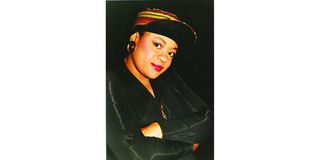
Congolese musician Tshala Muana.
Mamu Wenu is mother-in-law. A woman is fed up with her mother-in-law’s domineering manners. She has done a lot but Mamu Wenu doesn’t appreciate it, so she tells her off at last.
97. Kazet | Mahlathini & Mahotella Queens (South Africa)
In his early life, Simon ‘Mahlathini’ Nkabinde’s parents were worried about how deep his voice was and took him to a sangoma to see if there was anything wrong. He was only growing up. Grew up, he did, growling in between the harmonious tenors of Hilda Tloubatla, Nobesuthu Mbadu, and Mildred Mangxola. Kazet is just a gazette or cassette. The song celebrates music as a conduit for communal sharing of information.
96. Kunjani | Ricardo and Friends (South Africa)
Ricardo Groenewald’s breakout album, I Love You Daddy, featured some top songs but none was as catchy as Kunjani (how is the going).
95. Yeke Yeke | Mory Kante (Guinea)
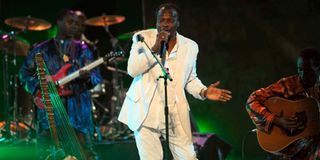
In this file photo taken on July 14, 2010 Guinea's singer Mory Kante performs during the 46th session of the International Carthage festival at the Roman theatre in Carthage, near Tunis. He died on May 22, 2020 in the capital Conakry after a long illness.
Mory Kante mixes languages -- Malinke, French, Managwa and others -- like a painter does colours. But it’s all an enamoured lover flattering the girl of his attention, calling her the movie star of his heart, the superstar...
94. Ndakuvara | Oliver Mtukudzi (Zimbabwe)
Ndakuvara means ‘I got injured’. A man assumes that because all his other oxen had been easy to train, this one will be too. But the ox rebels and kicks him. The man calls out to his wife for help. Tuku employs deep imagery. Beyond the ox, Ndakuvara is a warning: Those who have been submissive in the past will not stay that way forever. Someone will rebel. And kick you where it hurts most.
93. Nakomitunaka | Verckys (Democratic Republic Congo)
Verckys angered the Catholic Church in Zaire in 1971 with this composition that questions injustice against Blacks. He asks why everything good is depicted as white and the bad as black. Adam and Eve were white, Jesus white, God is white, so what is the origin of the black skin?
92. Sina Mali, Sina Deni | Khadja Nin (Burundi)
Khadja shows the comfort of having neither wealth nor debt yet be content in your life, float like a butterfly, shine like a star, laugh like a baby... It’s a seamless and stress-free life when you’ve neither of those two ‘burdens.’
91. Isencane | Platform One (South Africa)
This is a wedding song in which a woman laments that the bride is underage. “I will need a hand, who in their right mind would marry this child who is still young? My baby is too young to get married.”
90. Soweto Blues | Miriam Makeba (South Africa)

Miriam Makeba, South African music legend, performs at an international farewell tour in her home town of Johannesburg on September 26, 2005.
Released in 1977, Miriam Makeba’s Soweto Blues was written by her ex-husband Hugh Masekela as a lament for the victims of the 1976 Soweto Massacre.
89. Maria Salome | Saida Karoli (Tanzania)
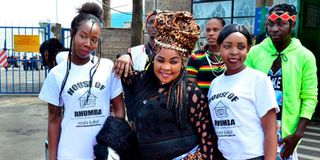
Tanzanian artiste Saida Karoli (centre).
Saida earned herself a nickname Wanchekecha in Uganda where fans picked on the words from the lyrics of this 2001 hit. The song, in Haya, is a tragic love story delivered through her captivating mellow and hypnotically rhythmic vocals.
88. Basiima Ogenze | Jose Chameleone (Uganda)
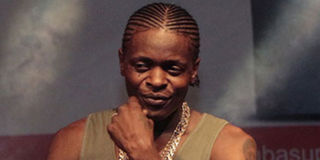
Ugandan singer Jose Chameleone.
Released in 2010, Basiima Ogenze chides humanity for always waiting until someone is dead then starts pouring praises on them. People remember you when you are gone, Chameleone says.
87. Kalayi Boeing | Wenge Musica (Democratic Republic Congo)
This ‘Bwingi’ (Boeing) thing, according to Didier Masela, a founder member, is about “how we became.” These boys had gone to Brussels by plane. ‘Tala Boeing’ (look at the aeroplane) and tokobina (we're gonna dance). They praise their car, saying it flies on the road like a Boeing.
86. Jambo Bwana | Them Mushrooms (Kenya)
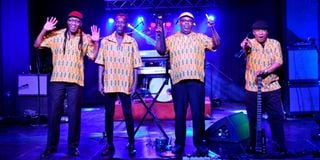
Them Mushrooms band members (from left) John Katana, Hamisi Madonga, Hassan Mandingo and Billy Sarro during a show at the Alliance Francaise auditorium on July 14, 2020.
Hello Sir! Jambo Bwana, released in 1982, praises Kenya and welcomes visitors to the east African country. It was widely picked up by hotels targeting tourists.
85. Nina | Pepe Kalle ft Nyboma (Democratic Republic Congo)
Nina is about a woman who is happy to have found the right husband. She loves the man but faces the envy of others who want them to separate. But she is determined to keep her man and advises the envious villagers to confess their sins and pray so that God gives them a man who can affectionately call them ‘Miss Nina Moseyi.’
84. I’m in Love (With A DJ) | Yvonne Chaka Chaka (South Africa)
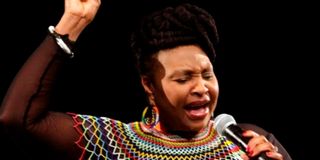
Yvonne Chaka Chaka.
If any DJ ever complains that they are not appreciated, ask them to play ‘Thank You Mr DJ or I’m in Love and shut up. It’s that lonely moment when radio is your only companion and all you have to do is surrender to the DJ’s disc.
83. Kiss No Frog | Lucky Dube (South Africa)

South African reggae star Lucky Dube.
Life was not as easy as finding a frog, kissing it, and hoping it would turn into a handsome prince. South Africans cozying up to the Apartheid Whites only ended up in regrets.
82. Eswi yo Wapi | Mbilia Bel (Democratic Republic of Congo)
Eswi yo wapi (Where does it hurt you?). A woman is done with her gossipy hubby who will sing praises of himself in the village for anything good he does for the wife but runs away when the woman is sick or has a problem. To remind him to leave her alone, she says even the house and car he gave her is him paying Adam’s debt to Eve.
81. Ndona | Verckys and Veve (Democratic Republic of Congo)
Like the maize by the roadside tale, Georges Mateta Kiamuangana is madly in love with Ndona but hates it that she is the object of attention of every man. The catch in this 1973 song is that Vercky’s mother had died and he wept while singing the chorus.
80. Chilen Koe | Monique Seka (Côte d'Ivoire)
This 1995 hit talks about the dilemma of love with a deaf. The girl who can’t hear can write, but the man cannot understand a thing, nor her language. They cannot express themselves but he loves her deeply because he searched everywhere and found no love until he met her.
79. Wedding Day | Brenda Fassie (South Africa)
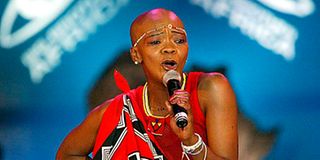
Brenda Fassie.
Christmas of 1989 was entirely a wedding. “I do, I do.” That’s how marriage is sealed. Brenda tells the bride she should feel so lucky to have the man, feel so happy on her happiest day and just waltz into the wedding moment.
78. Kimpa Kisangameni | Franco ft TPOK (DR Congo)
Kimpa Kisangameni means mysterious charms and Franco is telling his mother to see the charms that enemies have brought to kill him. He says his brother Bavon Marie Marie (died in 1970) was killed by sorcerers.
77. Mayaval | Mbilia Bel (Democratic Republic of Congo)

Legendary Congolese songbird Mbilia Bel poses for a picture on June 28, 2017 at Nation Media Group (NMG) offices when she paid a courtesy call to the company.
Marie Clare Mboyo sings about that friend we all have, the one you allow into your home out of compassion, raising them as your relative, only for them to bite you. Mayaval, she says, goes telling her husband all sorts of lies to separate the couple.
76. Sambolera | Khadja Nin (Burundi)
The Burundian has strong opinions about the so-called superpowers who want to determine how others live. Khadja subtly sings about malicious men with no compassion who talk like the world belongs to them. She says in the end these men will submit before God but when asked why they killed, they will say because of their colour. You know the colour, right?
75. Sadou | Franco ft TPOK (Democratic Republic of Congo)
A man goes triumphantly nostalgic after meeting women who spent their youth ridiculing his love for Sadou. They used to ask Sadou to leave him, they brought men to lure her away, they said he was useless since his job was worthless. But a few years down the road, he has become successful and now they envy Sadou who persevered in the marriage.
74. Lady | Fela Kuti (Nigeria)
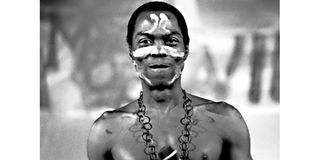
Legendary Nigerian artiste Fela Kuti.
Fela Kuti was a misogynist. He was brought up that way, he said in his bio. And he flaunts that chauvinism in this song, saying women today don’t want to be called ‘woman’, that they are ladies. He complains about women saying they are equal to men and says his ideal woman is one who cooks for him.
73. African Typic Collection | Sam Fan Thomas (Cameroon)
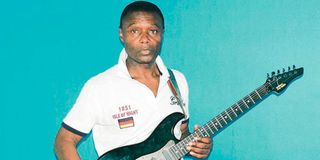
Sam Fan Thomas.
This 1984 hit is about Africa’s diversity; all the people with different roots and the different tribes in the continent. He adds music heritage to the list to say these make Africa a typical collection. The song is a medley of sweet African rhythm with melody borrowed from Franco’s Boma l’heure.
72. Chandra | Josky & TPOK (Democratic Republic of Congo)
If you have someone you love, go and tell them. Don’t wait until they are gone then you start regretting while playing Chandra. This, from 1990, is such a story.
71. Petit Pays | Cesaria Evora (Cape Verde)
This Cape Verdian morna is a tribute to a motherland by an immigrant homesick and longing for his small country that has morna and has coladera (both types of traditional music). The immigrant is full of praise of the motherland he misses.
70. Yellow Mealie | Lumumba ft Condry Ziqubu (South Africa)
This song talks of the days when households would run out of maize flour and the families would be forced to mingle the yellow (popcorn maize) flour for ‘posho.’
69. Wale Wetu | Khadja Nin (Burundi)
Khadja says people should stop moaning about their state because they don’t know the real face of poverty. That there are people who are very poor in this world yet they don't cry, they don't beg. They just bear it. They sing even if they are sleeping hungry.
68. Nadina | Mbilia Bel (Democratic Republic of Congo)
Mbilia Bel implores us to take time and repent to God, to pray even if once a week, to honour God and to praise Him.
67. Lusa | Oliver N’Goma (Gabon)
Lusa is how Olivier N’Goma, aka Noli, pronounced his wife’s name Louisa. She tells Lusa to not listen to rumours of neighbours because they gossip like mosquitoes. He says the people are like mosquitoes who whisper a lot in the ears before sucking one’s blood.
66. Nakei Nairobi | Mbilia Bel (Democratic Republic of Congo)
The original version of Nakei Nairobi (I am going to Nairobi) was released in 1984 about Duni (Elodie), a childhood friend she says is closer than a relative, closer like a twin sister, who had gone to stay in Nairobi. She has heard that this friend is suffering, so she says she will go over there to bring her back to Kinshasa.
In 1987, Moi banned foreign music targeting Congolese rumba that dominated the airwaves. Tabu Ley tweaked the lyrics in Kiswahili, saying “Let’s go go to Nairobi, so we sing for Baba Moi.” The ban was lifted.
65. Sweet Mother | Prince Nico Mbarga (Nigeria)
Forget the pidgin, the lyrics of this song, is a typical simplicity, like a child remembering all the details of what Mother did. When he cried, Mother carried him. If he was sick and could not sleep, Mother would not sleep either. Sweet Mother celebrates motherly devotion, praising a mother for her struggles and sacrifices in the upbringing of her child.
64. Taara | Baaba Maal (Senegal)
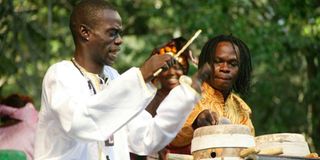
Popular Senegalese singer Baaba Maal (right) and a drummer in action during a past show at the Nairobi Arboretum.
This 1997 release calls African music the voice of gods and ancestors and praises the quality, bravery and greatness of pre-colonial statesmen such as Omar Saidou Tall, a west African political leader who founded the short-lived Toucouleur Empire encompassing much of what is now Guinea, Senegal, and Mali.
63. Amour Chercher Amour | Antoine Manana (Democratic Republic of Congo)
Love begets love. And boy, did Papa Disco spread love with this 1983 hit! Papa Disco says it is the heart that searches and no one can deny the heart or stop it. The heart’s quest for love comes haphazardly with many inexplicable decisions but who is innocent?
62. Non | Franco (Democratic Republic of Congo)
After being jailed for obscene songs ‘Hellene’ and ‘Jackie’ in 1978, Franco penned Non. Originally, the lyrics were a dig at a woman who had rejected him. But after band members such as Josky Kiambukuta refused to take part in it, Franco called on new recruit Madilu. He edited Non to a lament about the influx of marriage that is based on one-sided love.
61. Mamaland | Yvonne Chaka Chaka (South Africa)
Africa is our motherland but there is a man who came to the continent and started exerting his influence, calling shots on what the African man should do. Chaka Chaka says this is our motherland, our roots are here in Africa and calls for a united front against the invaders.
60. Mokolo Nakokufa | Tabu Ley (Democratic Republic of Congo)
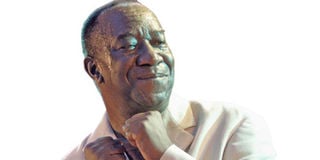
Congolese musician and cultural icon Tabu Ley Rochereau.
This 1967 song is adapted from folklore, or more specifically, a dirge. Mokolo Nakokufa (the day I die) gives perspectives of different persons on how their death would be like, the loved ones they will leave behind, the wealth or none thereof they will leave behind, who will mourn them...

In this undated photo, Congolese musician and cultural icon Tabu Ley Rochereau entertains fans at KICC, Nairobi.
59. Tuleke Tweliire (Obulo Bwaffe) | Tshaka Mayanja (Uganda)
Popularly known as Nakato Leka, this is an infectious reggae release from 1993. Sang in Luganda, this folklore tells of a time of food scarcity. Birds raided millet fields. A Nnalongo (mother of twins), sends out her twin daughters Nakato and Babirye to go chase away the birds from the field. The birds then sing to the twins, beseeching them (Tuleke) to let them eat (Tweliire) some of the millet (Obulo).
58. Bane | Oliver N’Goma (Gabon)
Arguably Noli’s most popular song that sold not him not only to Africa but the rest of the world. Bane means children and Noli is advising them to pay heed to what their parents tell them.
57. Premier Gaou | Magic System (Côte d'Ivoire)

Asalfo (centre), lead singer in the Ivorian band Magic System, gestures on stage late on December 3, 2014, in Abidjan, during the reopening of the theater at the French Institute of Abidjan which had been closed since 2003.
Premier Gaou or ‘First Fool’ is based on Magic System lead singer Salif Traoré’s true love story. Traore and girlfriend party like crazy on his little money. Then he runs out of cash. The girl leaves him. He strikes luck and becomes a celebrity so the girl returns asking for a second chance. He wants to kick her out but his groin rebels. He says to be used for the first time is okay, but a second time no-no.
56. Vulindlela | Brenda Fassie (South Africa)
How do you get back at gossipy neighbours who made a career out of mocking your son as someone who can never attract a woman into marriage? Brenda Fassie had the answer in 1997. She yells at the gossipy neighbours to open the door and make way because her son has got a bride and even warns them to not be jealous.
55. I Love You Daddy | Ricardo and Friends (S. Africa)
There has probably not been a Fathers Day in South Africa like that of 1988. It was on this day that Ricardo Groenewald released his first album, I Love You Daddy. From the perspective of an 8-year-old, this song touched hearts.
54. Kabasele en Memoriam | Franco and Tabu Ley (Democratic Republic of Congo)
A homage to Joseph Tshamala Kabaselle, aka Le Grand Kalle. Franco and Tabu Ley alternate their talents in this 1983 song. The two say “Nazuwa nganga wapi ye, asombela ngai liwa ya Kabaselle?” (where can I get a witchdoctor, to buy away the death of Kabaselle -- bring him back to life).
53. Sweet Mama | Pat Shange (S. Africa)
Pat Shange is singing about a lover. He is seeing his love attention dancing in the club and wishes she would come home and show him much more than just that. But who calls a lover Sweet Mama? The Mama is South Africa, the Apartheid one. The longing for that Mama to be the home that embraces its children with love.
52. Nyako Konya | Mangelepa (Kenya)
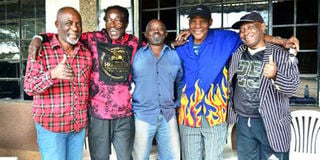
Veteran Les Mangelepa members (from left) Twikale Kalonda, Evany Kabanze, Ngongo Tabu 'super sax', Kaniki Lutulu Macky and Nzazi Kalenga Kibawa when they met at the Garden Square, Nairobi on July 11, 2019. The band is celebrating its 43rd anniversary.
Nyako Konya means girl help me. This song is a lament after marrying young and finding the going so tough one contemplates suicide.
51. Dede Sur Mesure | Zaiko Langa Langa (Democratic Republic of Congo)
‘Dede sur Mesure’ means Dede made special for me. The song was a dedication to Dede Kabaselle, one of Langa Langa faithful followers and relative to some former members of the group. In the song, we see the deep love for Dede and the earnest wish for that time they can become one.
50. Jabulani | PJ Powers (South Africa)
Jabulani is Zulu for rejoice or feel happy. The song was inspired by the Soweto concert of May 1982 where PJ Powers and her all-white band performed in what turned out an anti-Apartheid concernt. Jabulani encourages the people to find some happiness, to find romance and live life in all the hardships they face.
49. Wahito | Kanda Bongo Man (Democratic Republic of Congo)
Based on a true love story of Kanda and a Kenyan Rose Wambui Wahito. Kanda had met Wahito and fallen head over heels in love with her but he was banned from Kenya by the Moi regime in 1991, intercepted sneaking in to meet Wahito at least twice and deported. In the mournful song, Kanda marvels at Wahito’s beauty and urges her to love him.
48. Stimela | Yvonne Chaka Chaka (S. Africa)
Stimela, which is how the steam engine train was called, echoes the impatience with which South Africans awaited freedom. She questions if South Africans would ever reach their destination with the train of freedom taking such ‘kuchu kuchu’ time to arrive. Thina sijahile -- we’re in a hurry!
47. Maseke ya Meme | Bavon Marie Marie (Democratic Republic of Congo)
Bavon was Franco’s younger brother. Maseke ya Meme is the horn of a sheep and laments about witchcraft in a family that is envious of his success so much that some have resorted to planting fetishes at his doorstep. He says “what wealth do I have? I do not have money, what are we fighting for? I am crying for my life, I am not tired of living, but they want me to die.”
46. Soul Makossa | Manu Dibango (Cameroon)

Afro-jazz icon Manu Dibango who died of Covid-19 in Paris, France in March 2020.
From 1972 when it was released, Soul Makossa could not settle. It is so good its refrain was ‘lifted’ by Michael Jackson. Saxophonist and songwriter Dibango wrote the song to celebrate Cameroon’s football prowess and the hosting of the Africa Cup of Nations.
45. Tekere | Salif Keita (Mali)
Tekere means clap your hands. Keita was born into a prominent royal family who are descendants of the 13th Century king Sunjiata Keita who founded the Mandinka Empire in West Africa in 1240. But Keita was born an albino and thus ostracized. Rejected by his father, he resorted to music. In Tekere, Keita praises his own journey through music.
44. Papa Bonheur | Koffi Olomide (Democratic Republic of Congo)

Rhumba maestro Koffi Olomide.
If you are thousands of miles away from home and sending greetings to your loved ones via the telephone, you know it’s sweet to tell your papa that all is well, wish them happiness, and reassure them that you are okay among the damsels in Brussels…
43. Tika Kolela | Kanda Bongo Man (Democratic Republic of Congo)
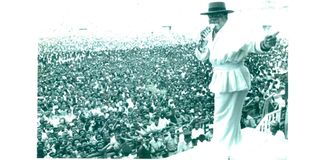
In this undated photo, Kanda Bongo Man performs at Nyayo Stadium in Kenya.
Kanda’s Cantique (1987), would have been it for its powerful gospel message calling on all to praise the Lord for all He has done, but Tika Kolela moves hearts with the way he urges Monique to stop crying because he sincerely loves her.
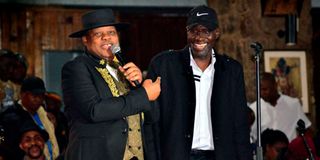
Kanda Bongo Man (left) with Fred Machoka on stage during the 28th edition of the Koroga Festival at Bomas of Kenya on December 1, 2019.
42. Homeless | Lady Smith Mambazo (South Africa)
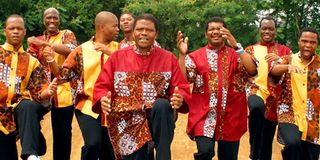
Lady Smith Mambazo.
Although the song is considered by many as protest music, Joseph Shabalala the phrase ‘we are homeless’ is similar to the words a Zulu uses when proposing to his bride.
41. Sina Makosa | Les Wanyika (Kenya)
Sina Makosa means I’ve not wronged you, why the resentment to the extent of wanting to kill me [for no reason]?
40. Victims | Lucky Dube (S. Africa)

South African reggae star Lucky Dube.
As prophetic as the song is, it tells of looking on as freedom fighters are killed by oppressors but eventually the victims turn on one another, making victims out of the already bleeding victims. Happens. Ask South Africans in the post-Apartheid.
39. Karibu Yangu | Tshala Muana (Democratic Republic of Congo)
C’est ca, c’est ca, c’est ca (This is it, this is it). A woman welcomes a lover and urges him not to feel lonely anymore, to bring the bride price home to her parents so that they can solemnise the marriage. She ends it with a warning to not be swayed by wild talks lest one died lonely.
38. Ya Jean | Madilu System (Democratic Republic of Congo)
Madilu’s breakthrough album Sans Commentaire in 1993 was packed with juice and Ya Jean certainly isn’t an adulterated one. A woman laments how her husband throws her out of marital bed on the basis of a dream he had that she was cheating.
37. Muchana | Kanda Bongo Man (Democratic Republic of Congo)
Muchana is Swahili for the sun. It was inspired by Kanda’s 1991 deportation from Kenya. As he was leaving under heavy security, he was touched by the hundreds of fans who cried over his rude exit. “Okolela ngai tango nyonso, na Muchana? (Will you cry for me all day till sunset?).
The beauty of Muchana is that few ever care about the message, because Djena Mandako and Abby Surya do all the magic alongside Nene Tchakou’s riffs.
36. Nantongo | Afrigo Band (Uganda)
Nantongo praises a woman in the simplest of ways. A man says of all the beautiful women he has seen, he has never met one as beautiful as Nantongo. He has gone to Lusaka of Zambia, was in South Africa and all over Kampala, people cry for Nantongo.
35. How Do I Know (If She Loves Me) | Lucky Dube
So you love a woman and madly so but people say she is seeing someone else. You helplessly look on while moaning about how you would ever know if she loves you. The tragedy is that she was with you but you failed to take your chances. To South Africans, it is like losing their land to whites and being told the land is dating the whiteman.
34. Independence ChaCha | Grand Kalle (Democratic Republic of Congo)
Independence Chacha was composed in January 1960 to celebrate DR Congo’s independence. “Indépendance cha-cha, tozoui e, Oh! Kimpwanza cha-cha, tubakidi.” (Independence, cha-cha, we’ve won it, Oh! Independence cha-cha, we’ve achieved it.)
33. Sondela | Ringo Madlingozi (South Africa)
Of weddings, when you shower your love with promises. Ringo’s ballad says come close, love. A man tells whoever is listening that she is the only one for him, and vows to never hurt her.
32. Ameyatchi | Mathey (Côte d'Ivoire)
Marie-Thérèse Kobla, aka Mathey, and Monique Seka have identical vocals. In Ameyatchi, a pleads with a friend to let her know what she could have done wrong. ‘Mbomi yonli wo nsê’ (what did I do to you?). She asks for forgiveness even without knowing what she did wrong. Like when your partner goes on silent treatment without you knowing why.
31. Boya ye | Mbilia Bel (Democratic Republic of Congo)
Boya ye. Leave him. That’s what a woman says people keep telling her... to leave the jobless man. They say she has only one loincloth because the man is poor. But she says he is the father of her kids and she is willing to suffer for her kids’ sake.
30. Clepo | Mathey (Côte d'Ivoire)
A mother is happy to see her child grow up. She asks men to help mothers raise children, not to abandon them. The song pays homage to children -- they are a blessing.
29. Shauri Yako | Nguashi N’Timbo (Democratic Republic of Congo)
Shauri Yako is Swahili for “it’s your problem.” A man is telling his wife Zena Fatou to go to hell because she demands an expensive lifestyle that is beyond his means. He says his ways and her ways are incompatible, he will not continue borrowing, steal, or kill to finance her expensive lifestyle. If Fatou cannot appreciate him as he is, then she should be gone for good.
28. La Musique | Rrum Tah (Cameroon)
“The music was playing, playing | And everyone was dancing and dancing | And everyone was very happy.” That is the chorus, about a partying moment filled with good music that creates an atmosphere of joy and unity in the village.
27. Agolo | Angelique Kidjo (Benin)
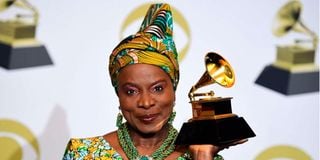
Beninese singer-songwriter Angelique Kidjo poses in the press room with the award for Best World Music Album for "Celia" during the 62nd Annual Grammy Awards on January 26, 2020, in Los Angeles.
Agolo is done in Fon gbe, a Benian language. The song is a celebration of Mother Earth, a song of hope and a call to the good powers of nature. “You hear it a lot when someone has a big load in the market and then they go ‘agolo agolo agolo’. Make way. So I called the song Agolo because our Mother Nature demands some attention from us,” she told Cape Argus in 2017.
26. Awa Awa | Wes (Cameroon)
Off Wes Madiko’s debut album, Walenga, in 1996, Awa Awa says the best way to live is in harmony, in peace with one another. That we all gather around the earth, dance the dance of peace. Whatever the colour of our skin or our culture, our religion, we can leave all such things at the edge of the desert, forgive each other and dance the dance of peace.
25. Sacramento | Tabu Ley (Democratic Republic of Congo)
From Tabu Ley’s duet with Canta Nyboma in 1986, a sacrament of love is that sacred deed you can fulfill with your own ‘santo lamu’ (saint of love). It is a gospel song about that time for penitence for earthly transgressions.
24. Nzele | Madilu System (Democratic Republic of Congo)
From Sans Commentaire album in 1993, a man bemoans how his marriage to Nzele broke up because of gossip. Afraid of the way the marriage was going, he rings some rules for Nzele and reminds her that if she broke them, the gossips will laugh at him. She gets tempted, leaving the man in regrets.
23. Nafkot | Aster Aweke (Ethiopia)
Singing in Amharic, Nafkot is about her love for her man who is away. You could feel the longing in her voice, the pain and all. But for Aster who lived in self-exile in America for nearly two decades, that love could as well be for her motherland.
22. Malaika | Miriam Makeba (South Africa)
Composed by Tanzanian musician Adam Salim in 1945 but Kenyan Fadhili William was the first person to record the song in 1963 and since Salim did not put a copyright to it, the song has been redone by dozens of musicians. Miriam recorded her single in 1974 and popularised this story of a young man who cannot afford a lover’s asking bride-price. All he can do now is sing his love...
21. Maze | Tabu Ley (Democratic Republic of Congo)
I love you, baby touch me is about a woman of love interest, with the suitor lavishing all sorts of praises. He even says Maze’s face looks like five O’Clock. Ley ends the adulation with ‘I love you, baby touch me, Oui, je suis a toi, cherie pense moi’ (Yes, I’m yours, think of me.)
20. Ndaya | Mpongo Love (Democratic Republic of Congo)
This 1976 ballad is as soothing as morning dew. The song criticises polygamy as Mpongo says she will not share her Ndaya with any other woman, that her marriage is one for her alone. She says her love with Ndaya is like the relationship between a trouser and a belt.
19. Luvi Wami | Platform One (South Africa)
Also called Lezontaba, Luvi Wami, means my darling. A lover feels lonely, looks at a hill in the distance and says it brings back all the fond memories of Luvi Wami because they used to go there.
18. Todii | Oliver Mtukudzi (Zimbabwe)
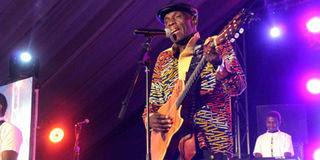
Zimbabwean musician Oliver Mtukudzi on stage during a Kigali Jazz Junction.
Tuku sings Todii in Shona, Ndebele and English. Todii is an HIV/Aids awareness song taken off the Tuku Music album. In the song, Tuku laments the death toll caused by the disease, punctuated with the heavy question, what shall we do?
17. Tarihinda | Cecile Kayirebwa (Rwanda)
Tarihinda is an exhortation and encouragement to the pleasure of dancing, singing, and reciting poems with joy and happiness. It celebrates Rwandan culture. Kayirebwa pays tribute to famous artists, dancers, inanga (Rwandan traditional instrument) players and singers.
16. Zamina mina | Zangalewa (Cameroon)
The longest song you will never want to hear ends. You could listen to it from 1986 when it was released to the time of reading this and still have no qualms at all. Zangalewa band members were in the Cameroon army and this song, in pidgin, French, Douala and ‘broken’ English, was done for comic relief by the military recruits detailing the situation in the camp.
Tsaminamina means come and waka waka is pidgin for ‘walk while working.’ No slacking. They lament about the hardships in the army, the bad food yet money no deh . Amid all these, they say man no run (they won’t give up).
15. Sinzia | Nameless (Kenya)

Nameless at a past performance.
Nasinzia is to fall asleep. Nameless goes bonkers in this 2005 hit with praises that borders on insanity. He reels off phrases to emphasise her beauty, saying he wished he was her body lotion to enjoy her skin, or her shoes to see the view up, or saliva to taste her lips…
14. Wombo Lombo | Angelique Kidjo (Benin)
This 1996 song wouldn’t be on this list if only for its lyrics but it is here because it must be. The song is for the spirit of a dance, one so enchanting no man should just be standing yet there is one such. Do you think anyone else can do it?
13. Mamou | Franco & TPOK (Democratic Republic of Congo)
A woman laments about her friend (Mamou) for whom she covers but Mamou goes around blaming this woman for her woes. Mamou is a cheat but tells her husband that every other man she is found with is her friend’s boyfriend. Yet Mamou goes around blaming the same friend for her marital woes.
12. Mama | Khadja Nin (Burundi)
Khadja pays tribute to mothers for all they have to put up with for their family, day and night. That even when they raise their voice or hand at their children, they do so to protect them.
11. Remember Me | Lucky Dube (S. Africa)
From 1989 to all the men who sire children, leave them with their mother and move ‘disappear’. Lucky Dube brings out the cruelty of rural urban migration on families as fathers go to look for jobs, leaving behind children yearning for them.
10. Muzina | Tabu Ley (Democratic Republic of Congo)
Muzina. In the name. Probably Ley’s last real installment and it was like he had saved the best for last. A gospel tune with a sebene that is terrific for the dance floor. Ley exhorts everyone to pray to God, praise God and thank God for his blessings.
9. Mama | Brenda Fassie (S. Africa)

Brenda Fassie.
From the album by the same title released in 1994, Brenda Fassie pays the ultimate tribute to her mother Sarah Fassie. This is a dirge like no other.
8. From Me To You | Yvonne Chaka Chaka (S. Africa)
From 1987 to-date, you can still hear Chaka Chaka spread love with this infectious pop hit. She asks us to join her in finding the love and peace we once knew, and to spread them.
7. 7 Seconds | Youssou N’Dour ft Neneh Cherry (Senegal)
Cherry suggested co-writing an anti-racism song. 7 Seconds’ title refers to the first moments of a child’s life, as Cherry put it, “not knowing about the problems and violence in our world.”
6. There is an Answer | PJ Powers (S. Africa)
‘There Is An Answer’ urges South Africans to accept that there is still a chance to share their motherland’s love with all. The song solemnly asks the invisible hands to help South Africans to put the past behind them.
5. Pata Pata | Miriam Makeba (South Africa)
First recorded in 1959 as Phata Phata, Mama Africa redid the song in 1969, added a few English words like “Every Friday and Saturday night, it’s Pata Pata time.” It became an instant hit globally. This is a song about a flirtatious dance move. ‘Pata’ translates as ‘light touch.’
4. Think About the Children | Lucky Dube (S. Africa)
Lucky Dube’s passion about family values continues in this hit from 1989 in which he bemoans the fate of children born without parental care and guidance. They are born to suffer because they have no one to show them right and wrong.
3. Mario | Franco (Democratic Republic of Congo)
Mario was inspired by a Portuguese gigolo acquaintance of Franco. It is about a young man who, despite his education, prefers to live off the earnings of sugar mummies. Franco urges Mario to look for one woman to marry instead of attending to older women.
2. Alone | Philly Bongoley Lutaaya (Uganda)
Lutaaya’s greatest song about HIV/Aids. Alone, from his last album in 1989 titled Alone and Frightened, preaches about the disease and calls on the people not to shun the afflicted who only need love and hope.
1. God Bless the Woman | Lucky Dube (South Africa)

South African reggae star Lucky Dube.
We praise heroes everyday, but we forget to praise, the women of this world… The mournful voice with which Dube executes this 1995 song would leave any woman weeping. Now imagine the children yearning to meet their father...





